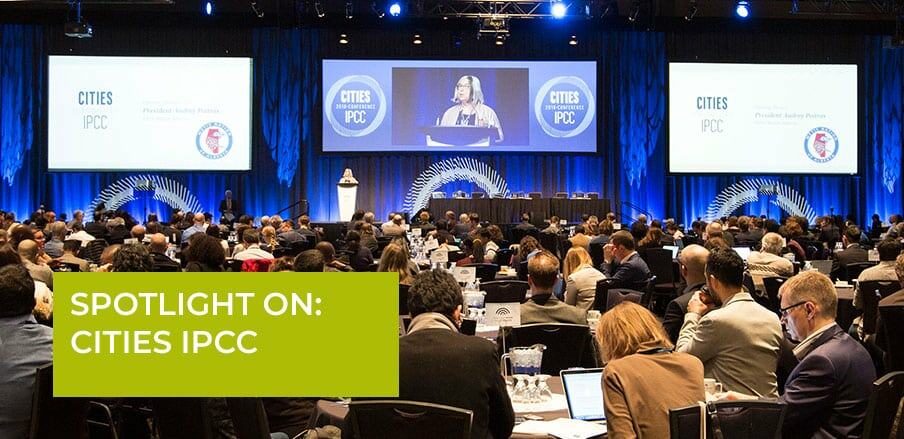Cities and scientists join forces in the fight against climate change
By Stephen Leahy
More than 700 climate scientists and city planners have gathered in Edmonton this Monday for the CitiesIPCC—Cities and Climate Change Science Conference. The three-day gathering marks the first time cities rather than nation states are offered a seat at the table of the U.N.’s top scientific authority on global warming. At day one, data collection and analysis for effective emissions reduction and their potential for social inclusion has been the main focus.
“Give me simplicity on the other side of complexity,” said Leroy Little Bear of Kainai First Nation in Alberta at the pre-conference session IPCC Cities and Climate Change Science Conference in Edmonton. In a conference designed to set the scientific research agenda for cities, Little Bear, an indigenous elder said the challenge of climate change required a change in thinking. And that requires stepping back and examining our metaphysics or world view in order to ask “where are we going?”
Indigenous and local ways of seeing and understanding the world are for the first time a significant part of the Intergovernmental Panel on Climate Change (IPCC) process under way this week that will inform a Special Report on Cities and Climate Change expected as part of the IPCC’s seventh assessment. However, the main focus of day one was on data collection and analysis.
“We must make data available at the city level and apply it to drive innovation and technology,” said William Peduto, Mayor of Pittsburgh at the Global Mayors Summit, another pre-conference event on Sunday. Policymakers, scientists and city networks discussed key knowledge gaps that cities need to bridge to accelerate local climate action and how the research community can help.
[inlinetweet prefix=”” tweeter=”urbanet_info” suffix=””]There is a pressing need for data and evidence to overcome populism and to use it as base for effective policy making[/inlinetweet], Don Iveson, the Mayor of Edmonton, told over 700 attendees in the opening plenary on Monday. Cities use two thirds of the world’s energy, emit 70 percent of carbon dioxide and yet occupy two percent of the world’s landmass and have a vital role in meeting the climate challenge he said. “Cities need more data, including consumption-based accounting to understand our true carbon footprint.” Iveson noted that Edmonton is building a net-zero community for 30,000 people, which is a challenge in a city where 95 percent of its energy comes from fossil fuels.
[inlinetweet prefix=”” tweeter=”urbanet_info” suffix=””]Cities do need more data on where their emissions are coming from. With this information they can manage them better and know where to put their money [/inlinetweet]to improve their resilience to the impacts of climate change, said Amy Luers, Executive Director of Future Earth International. “Cities are critical to mitigation, adaptation, meeting the sustainable development goals and reducing inequity,” Luers said. Systemic thinking is needed because these are interrelated. As much as a new research is needed for cities, so is an innovation agenda. “If we can clearly articulate what are the big problems we need to solve, creative innovators can help us tackle them,” she said.
In the global south there is little data on informal settlements, which can compromise 60 percent or more of a cities’ population. “They are invisible, and their voices excluded,” said Sheela Patel of Slum Dwellers International. Aside from recognition and involving slum dwellers in decision making, science and policy need to be translated into simple actionable ideas for the poor. “The poor aspire to be big consumers and they need to be involved,” Patel said.
In Dhaka, Bangladesh, a city of 10 million, about 21 percent of the people in informal settlements are internal climate migrants fleeing flooding, or storms or drought. “Even though climate migrants earn more in the city, they don’t want to live in Dhaka but they have nowhere else to go,” said Mohammad Nurul Islam Nazem of the University of Dhaka. Even though the number of climate migrants will increase in future the issue is largely ignored by governments, he said.
Echoing Little Bear, Aromar Revi, Director of the Indian Institute for Human Settlements (IIHS), said, given the challenges we need to do everything differently: energy, land use, governance and finance. Over the next 20 to 30 years, Asian and African cities will build out much of their infrastructure. But if this is not done right cities risk becoming the world’s largest ‘stranded assets’. [inlinetweet prefix=”” tweeter=”urbanet_info” suffix=””]The other major challenge is changing consumption patterns – the current one simply can’t continue. That will require people standing together and refusing to participate in the consumer society[/inlinetweet], Revi said.
“We are already two thirds of the way to 1.5C”, he reminded delegates.
